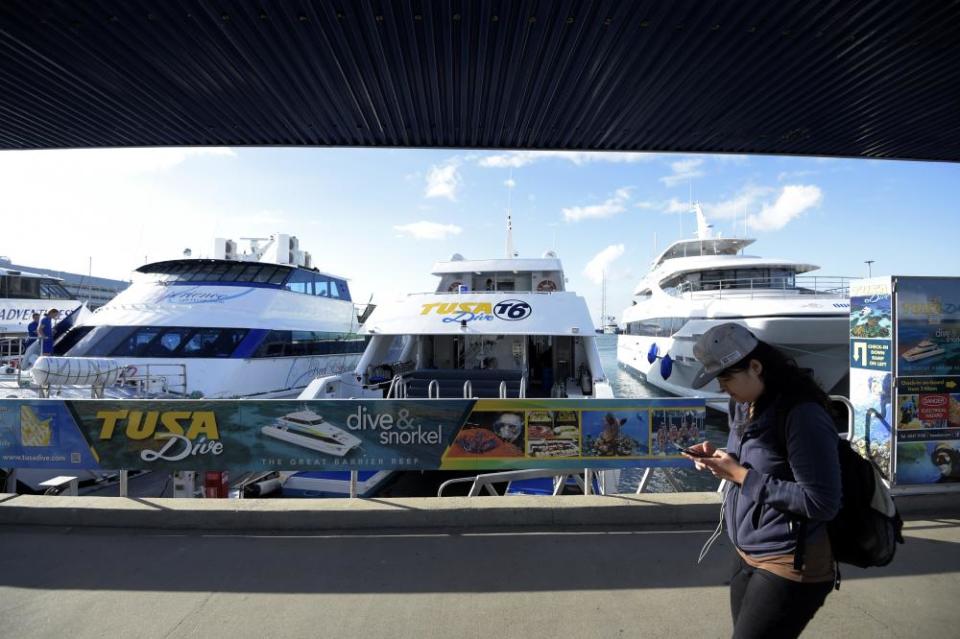‘We’re losing $6m a day’: Queensland's tourism industry pleads for more attention

It’s the industry that provides at least 140,000 jobs across Queensland, with most of them outside of Brisbane, but both major parties in the Queensland election have been unusually quiet on it.
Tourism is one of Queensland’s biggest industries but the parties instead seem focused on mining and manufacturing. The premier, Annastacia Palaszczuk, and the opposition leader, Deb Frecklington, have been making regular announcements of support packages for blue-collar industries – the sort of announcements that lend themselves to hi-vis photo opportunities.
The Palaszczuk government has pledged $74m for the tourism sector, but much of it is to promote the state, with only $15m pledged for regional areas. And the Liberal National party has committed $50m for destination marketing, but that is a drop in the ocean compared with what has been lost.
Related: Queensland election: party insiders say minority government is increasingly likely
Tourism Tropical North Queensland’s chief executive officer, Mark Olsen, said the industry generated a record $3.5bn in the 12 months before the Covid-19 lockdown in Australia, but “with the border closures our industry has been losing $6m a day”.
“We are heading into the time when we traditionally see a spike in international travellers thanks to the northern winter boosting visitation to around 55,000 visitors a day.”
Many in the Far North’s tourism sector will struggle to survive through to the next financial next year if lockdown conditions continue, especially with jobkeeper expected to be rolled back by March 2021, a sentiment shared with the guardian by several business owners.
Kuku Yalanji man Juan Walker, owner of Walkabout Cultural Adventures, a small operation that provides bespoke Aboriginal cultural tours around Port Douglas and the Daintree, said: “Business was booming before Covid, but then it dropped to zero.”
With 80% of his business being international travellers and most of his domestic market from Melbourne, the Covid-19 lockdown has seen Walker’s business evaporate overnight.
People are totally ready for a more sustainable way of doing things
Matthew Wilson, B&B owner
Before the lockdown in March, Walkabout Cultural Adventures employed Walker and two other guides full-time, as well as his wife, who did the business administration. All of them are now on the jobkeeper allowance.
“Personally, I have managed to keep my name and my brand alive through all this, by just keeping out there, so everyone knows who we are,” Walker said. “I think the government needs to stop looking at mining and big industry, because without China buying that’s going to fall on its arse anyway.
“We need to be investing in land management and land preservation, and what better way to do it than through tourism?”
Matthew Wilson, owner of Epiphyte Bed and Breakfast in the Daintree, also lost most of his business with the lockdown.
“Even though I am on jobkeeper, I have still lost more than 70% of my income this year with the loss of international travellers and with loss of Victorians, who are by far the biggest domestic travellers to north Queensland,” he said. “The vast majority of my costs are fixed costs – things like insurance, rates, booking platform costs and general maintenance costs, all of which I can’t compromise on.”
Related: 'Not everyone wants to swing a shovel': Queensland election jobs plans miss the mark
Wilson said a scheme, such as in the UK, where the government subsidised some of the cost of travel or meals to encourage people to spend could help restart the industry.
Related: Cairns feels the pinch as coronavirus turns city into a tourist ghost town
“People are totally ready for a more sustainable way of doing things by moving away from coal and into renewable energy. It’s a really good way to kick start the economy,” he said.
“With us all having gone through this experience together, where we have had some level of bipartisan politics at a national and a state level, we need to not go back to the polarised political nonsense where the parties always take the opposing position.”
The chief executive of the Association of Marine Park Operators, Gareth Phillips, said that before Covid, his sector – marine tourism, much of it on the Great Barrier Reef – attracted 2.5 million tourists a year and generated more than $800m for the Queensland economy and $6.4bn for the national economy.
“We need cost reduction, and not just in isolated areas but across all the industries operating on the Great Barrier Reef. The industry as a whole is 80% down on this time last year,” he said.
“Shopfronts offices, rates and taxes, charges, licensing fees – all these fees we need relief on. Literally every operator is running in the red, so a way to help us reduce our costs, this is what we need.”
Phillips said the continuing border closure was crippling business and Covid-19 restrictions threatened to compromise any economic recovery when borders opened.
“If things don’t improve by this time next year, it’s going to change the landscape of the industry. Some companies have more resilience, but unfortunately if things do not improve, we will lose companies. But hopefully it doesn’t come to that.”

 Yahoo Finance
Yahoo Finance 